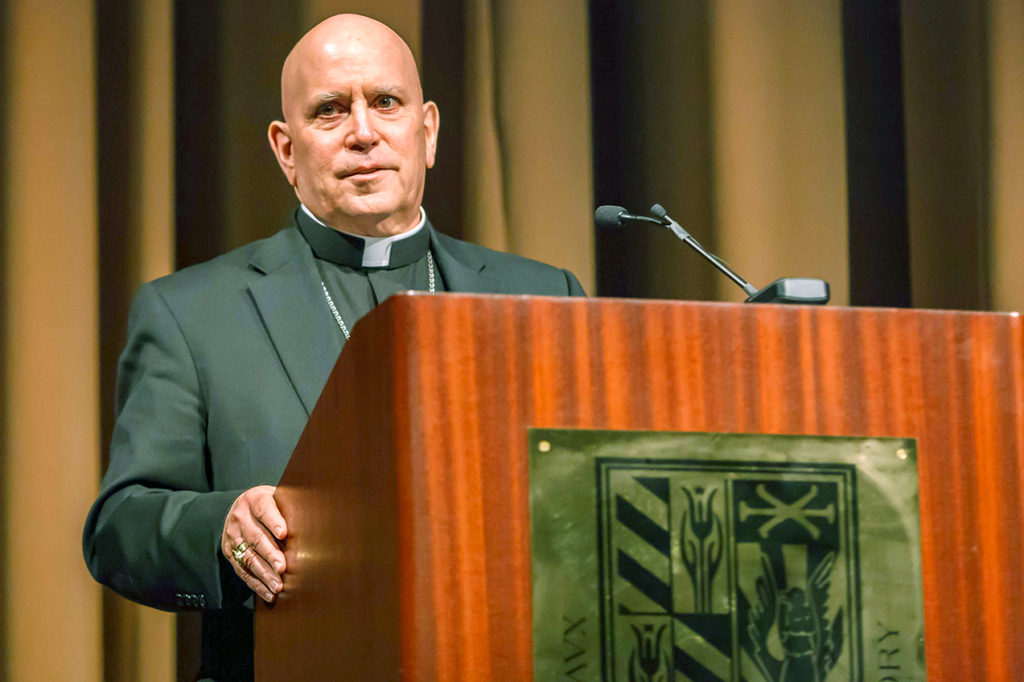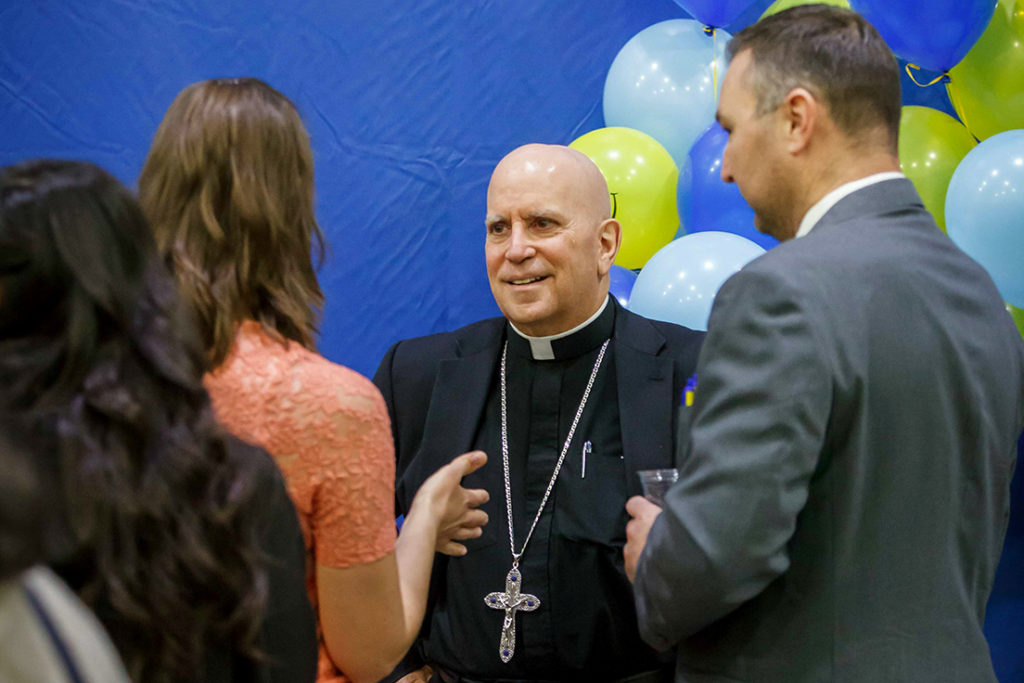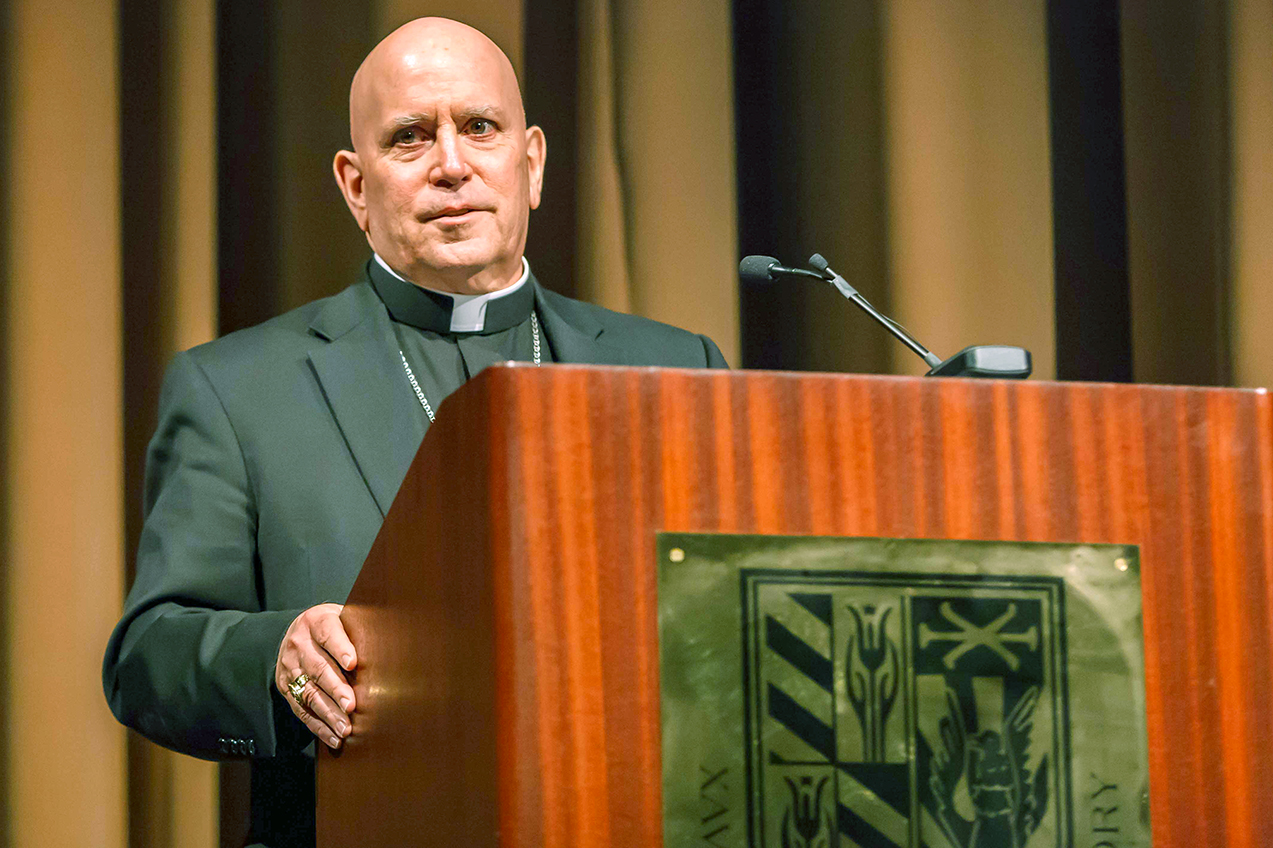
Society today has a “toxic” understanding of love, marriage, sex and the family as it relates to God and the gift of human sexuality.
To counteract what popular culture has divided, several hundred people gathered in honor of the 50th anniversary of Blessed Pope Paul IV’s encyclical “Humanae Vitae,” Feb. 24, for the 12th annual St. John Paul II Celebration and Fundraiser at Xavier College Preparatory. The annual fundraiser supports the work of the diocese’s St. John Paul II Resource Center for Theology of the Body and Culture.
Keynote speaker Archbishop Samuel J. Aquila of Denver said the late pope’s encyclical was prophetic in that it defended the probity of married love and warned against using sex for mere pleasure.
“No laws can change the human heart,” Archbishop Aquila said. “Only the discovery of the truth and meaning of human sexuality and the dignity of the human person will change the hearts of people.”
The archbishop said human sexuality has been warped by societal ills like sexual trafficking of women and minors, pornography, contraception, sexual intercourse with robots and the view of marriage as a means of “pleasure and self-satisfaction,” which is void of “authentic relationships” modeled upon the “perpetual, selfless outpouring of love found within life of the Holy Trinity.”
He explained sexuality as a “gift” that, when expressed through “God’s plan,” is life-giving and leads to “authentic freedom (faithful, human).”
Archbishop Aquila, who released a pastoral letter in February called, “The Splendor of Love,” reaffirmed the Church’s teaching on human sexuality and encouraged people to live it out.
“The gift of our sexuality can be life-giving and promote a generous culture of encounter, reflecting the inner life of the Trinity or it can be neglected, misused, distorted, squandered thus leading to human devastation and profound sadness,” he said. “Many of us here have had both of these experiences in life, and our toxic culture is not one of happiness but sadness.”
Theology of the Body, written by St. John Paul II in defense of “Humanae Vitae,” explains God’s view on marriage, sex, living together, creation and how God’s original plan is still in effect through Jesus. It shares how the human body is symbolic, free, meant for love and redeemed by Christ.

“It’s the call to make the gift of self … our bodies tell the meaning to be a human person,” said Katrina Zeno, coordinator of the resource center. “We are made for a unifying love that is life giving.”
The resource center, which is funded primarily through private donations, provides talks and workshops on dozens of topics to Catholic school teachers, clergy, parents, teens and others to keep the legacy of St. John Paul II alive.
She said the topic is a “wildfire exploding around the world” because people are “recapturing an understanding of who God is.”
Dcn. Jason Robinson, who attended the event with his teenage son and wife, said family talks are important because of all the “confusion in our society” that tends to trivialize trending topics and pass them off as “warm and fuzzy.”
“It’s challenging times,” Dcn. Robinson said. “We need to love and respect others but not to the point it actually breaks down the unity.”
Longtime resource center supporters Anne and Les Wright, married 47 years, both expressed their admiration of Bishop Thomas J. Olmsted and his implementation of Natural Family Planning and Theology of the Body in the marriage preparation classes.
“I don’t know what we’d do without the hope out there,” Ann said, adding, “this is a big deal to us.”
Bishop Olmsted, who was warmly received with a standing ovation, recalled during his doctrinal studies in Rome, he started working with St. John Paul II the week he began his Wednesday audiences on Theology of the Body. He joked his formation with the saint was a formidable experience as he was “thrown into the deep end of the pool.”
Bishop Olmsted said the diocesan resource center “keeps before us the beauty and profound truth of the Theology of the Body, so vital at a time when there is so much confusion about human nature, the dignity of each person, the meaning of masculinity and femininity and the identity and mission of marriage.”







